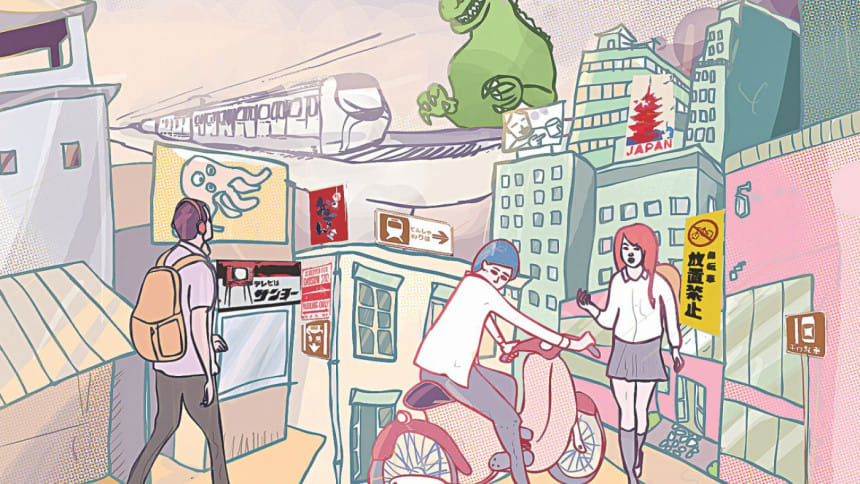Why Bangladeshi students should consider studying in Japan

According to the latest data from UNESCO, over 30,000 Bangladeshi students are pursuing higher education overseas. Malaysia had the highest number of Bangladeshi students at 6,534 students in 2015 followed by USA with 5,441 students. UK and Australia were also among the popular destinations while Japan had 876 Bangladeshi students in 2014.
Japan is worth being considered a desirable study-abroad destination by more Bangladeshi students as it offers something students often seek: the opportunity to work in the foreign country they graduated from. Moreover, Japan has affordable tuition, scholarships, and availability of part-time work for students. But, students do have to be willing to learn Japanese in order to reap these benefits.
While some Japanese universities offer programmes taught in English, not all do. Therefore, it depends on the requirements of individual universities if a student needs to learn Japanese in order to pursue a degree in Japan. Universities that do offer programmes in English may require applicants to show proof of English language proficiency such as IELTS. If the student's targeted university does offer the relevant classes in English, then the student can learn Japanese once they are enrolled there, although it is advisable to have at least a basic idea of Japanese so that learning a new language along with university education will not be overwhelming later on.
"Japanese language can make life smooth and easy here," advised Fatemee Muhammad, who worked at KDDI Corporation in Japan after completing his BBA at Ritsumeikan Asia Pacific University, to prospective Bangladeshi students who want to study and live in Japan. He also shared that while the first one or two years can be tough, people do get used to the culture.
Cost of education in Japan is less expensive than that of universities in countries like UK and USA. And scholarships are available on top of that, including those from the Japanese government (MEXT), Japan Student Services Organisation (JASSO), and others provided by private foundations. According to QS Top Universities, the academic expenses in Japan can be around USD 4,140–8,280 annually, while the average cost of living in Japan is USD 740 per month. The cost of living is lower in rural areas as opposed to metropolitan areas.
International students can work up to 28 hours a week with approval from the Regional Immigration Bureau, provided that their work does not interfere with their studies. "Students can often earn enough money for their living expenses as well as most of their tuition fees from part-time jobs alone," said Rouham Manzoor, Managing Partner at MACES, an overseas educational counselling firm, citing this as one of the reasons why students choose to go to Japan.
When it comes to obtaining a student visa, having a Certificate of Eligibility (COE) reduces the visa processing time. To apply by this method, a student or their proxy will have to apply for the COE prior to applying for a visa and the COE will be issued to them at Regional Immigration Bureaus in Japan. The student can then go to the Embassy of Japan with their COE to apply for a visa. "Unlike high visa rejection rates in countries like USA and Canada, Japan offers high visa success rates for aspiring students once they receive the COE," said Rouham.
After completing graduation and securing employment, international students need to obtain a work visa by applying for a change in the status of their residence at the Regional Immigration Bureau. According to the website Japan Study Support, immigration control will check if the applicant's education background matches their technical skills and the knowledge they possess, and if their job actually utilises their skills and knowledge. Immigration control will also check if the company in question is stable in terms of management and business performance, and if the applicant's salary is appropriate.
As for searching for a job, JASSO advises international students to begin job hunting activities early and acquire enough information to allow them to act efficiently. This is the key to successfully finding employment in Japan.
Fatemee said he chose to work in Japan following his graduation as, "Fresh graduates are treated as if they have the ability to learn after starting the job as opposed to having all the abilities before even starting work. And, many internationally recognisable companies are here in Japan."
Fatemee, on the other hand, secured his job from one of the companies that visited his university for recruitment. A student can start seeking employment during the fourth year of undergraduate study so they can secure a job before graduation. Fatemee recalled that searching for a job was challenging as the recruitment process in most companies was in Japanese, but found his university to be very supportive.
The writer graduated from Baruch College, City University of New York.

 For all latest news, follow The Daily Star's Google News channel.
For all latest news, follow The Daily Star's Google News channel. 



Comments